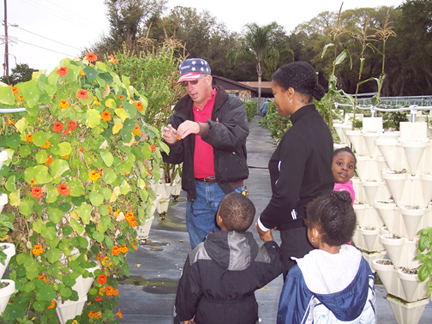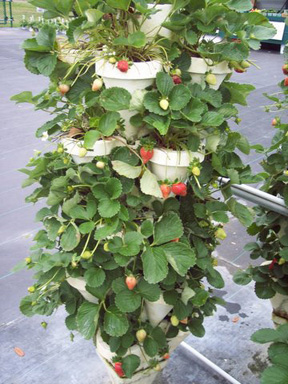

 |
||||||
 |
||||||
Future of Florida Farming May Be Rising in Dover
by Victoria Parsons
The future of farming in an increasingly urbanized region may be rising on a small tract of land outside Dover. Instead of field-grown crops that demand large amounts of water, nutrients and labor to plant, grow and harvest, five-foot-tall stacks of polystyrene containers are producing bountiful yields of strawberries, tomatoes, lettuce and herbs.
 |
|
Photo: Victoria Parsons |
The numbers tell the story, says Gary Parke, owner of Parke Family HydroFarm and son of the state’s largest strawberry farmer.
First the numbers:
Up to 20 types of plants – everything from Plant City’s famous strawberries to heirloom tomatoes, herbs, peppers, cukes and even a giant nasturtium – grow in rows of HydroStackers™ that are just four square feet. They’re fed three times a day, rain or shine, with 1.6 ounces of water and a proprietary blend of fertilizer that’s used on all the plants he grows.
“It’s kind of cheating, but it works,” says the father of four home-schooled children who often help out on the farm. “People talk about what hard work farming is, or how back-breaking it is to pick berries, and I just smile.”
District Grant Funds Expansion
Eric DeHaven smiles when he talks about the HydroFarm too. Director of the Southwest Florida Water Management District’s Resource Conservation and Data Department, DeHaven helped get Parke a $112,000 grant to double the size of his operation. “It’s a new method of farming that offers tremendous water savings compared to traditional farming in beds,” he says. “It’s also helping to keep agriculture going in an area that’s under a lot of pressure from (residential) development.”
 |
|
Photo: Victoria Parsons |
The grant, made through the district’s FARMS – Facilitating Agricultural Resources Management Systems – program is part of a district-wide initiative that has helped the agricultural industry conserve approximately 11.5 million gallons of water per day. The 75% cost-share program allows farmers to purchase water-saving technologies they couldn’t otherwise afford.
Farmers have traditionally held permits to pump groundwater, so minimizing their water use and encouraging alternate sources impacts the entire region. “We’re trying to cooperate rather than regulate,” DeHaven says.
DeHaven estimates the HydroFarm saves about 36,000 gallons per day – a small part of a much larger program – and also serves as an informal pilot program to show other farmers that hydroponics can be profitable.
“Farmers are stewards of the environment and this kind of innovation can really make a difference,” he says.
 |
|
Photo: Victoria Parsons |
Even in areas outside urban Tampa Bay where the pressures of growing populations make agricultural uses less feasible, citrus canker and other diseases have forced farmers to re-think their traditional crops and methods. FARMS grants help pay for technology such as moisture sensors in soil that indicate exactly when and where water is needed or thermometers that call cell phones when temperatures hit 33 degrees so sprinklers can be turned on to protect plants. Other funding has focused on helping farms establish alternative use systems that draw upon surface waters or capturing stormwater that also helps farmers recycle excess nitrogen.
Hydroponics are relatively new to the water conservation mix but hold great promise, DeHaven adds. “I think we’re going to see more and more hydroponic farms as people learn more about them.”
A Growing Trend
That’s starting to happen already, adds Chester Bullock, a one-time Missouri farmer who invented the HydroStacker and now runs Hydro-Taste Farm in Myakka. The Parke farm has space for 160,000 plants; two other Florida organizations are expected to announce construction of farms with two million plants each later this summer.
Although big farms switching to hydroponics are more likely to make the news, the same revolution is happening in backyards across the country, he said. “We’re already in 200 schools, all 50 states and 31 countries,” Bullock says.
Made of tough polystyrene with a lifetime guarantee, the HydroStackers are filled with a mixture of perlite and vermiculite and planted in double rows that run north and south to capture as much sun as possible. HydroStackers are designed to use a proprietary formula that has been certified as “bi-organic” for use in soilless systems but not soil.
In a nearly perfect environment, insect pests are seldom a problem. “We ask u-pick customers to wash their hands with an anti-bacterial soap before entering the farm, but that’s the only pesticide we use,” Parke said. And while Bullock recommends spraying an organic fungicide weekly, it’s not always necessary. “Sometimes I remember to do it and sometimes I don’t,” Parke says.
A second half-acre plot, funded partially with the SWFWMD grant, includes a new larger HydroStacker designed for long-lived and larger plants like blueberries. Parke also will plant asparagus, a real treat for Floridians who have always been told it doesn’t grow here.
“I don’t believe it when somebody says you can’t grow something,” Parke said. “Most farmers harvest strawberries from Christmas to Easter, we already go from Halloween to the Fourth of July. We’re going to try a summer crop and see if we can’t grow berries year-round.”
| If you go: Parke Family HydroFarm is located at 3715 Tanner Road in Dover, just north of Martin Luther King Boulevard, and is open 9 a.m. to 5 p.m. Tuesday through Saturday. Call 813-719-2904 or 813-927-4049, or visit www.parkehydro.com. HydroTaste is located on Verna Bethany Road 13 miles east of I-75 off State Road 64. Call 941-322-0429 or visit www.hydrotaste.com. |
Future of Florida Farming May Be Rising in Dover
Don Whyte: Greening the Vision of Development
Estuary Program Awards $160,000 in Community Grants
Mote's Founding Director Celebrates her 85th Birthday
The Pier Aquarium Prepares For its Grand, Grand, Grand Reopening